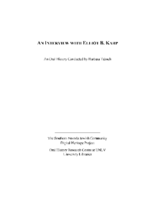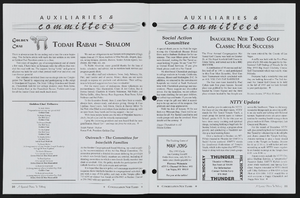Search the Special Collections and Archives Portal
Search Results

Transcript of interview with Walter Dane by Ann Clark, March 11, 1978
Date
Archival Collection
Description
On March 11, 1978, Ann K. Clark interviewed her step grandfather, tire repairman Walter Dane, (born August 10th, 1914 in West Barnett, Vermont) in her, the interviewer’s, home in North Las Vegas. Also present during the interview is the interviewer’s mother, Marie Dane. Walter relocated to Indian Springs in 1930 before settling in Las Vegas in 1943. In 1968 he moved to Utah, where he resided at the time of this interview. Well-traveled, Walter discusses his many moves over the years. Ultimately, this interview covers the growth and development of the Las Vegas and Indian Springs areas.
Text

Transcript of interview with Elliot B. Karp by Barbara Tabach, December 17, 2014
Date
Archival Collection
Description
Interview with Elliot B. Karp by Barbara Tabach on December 17, 2014. In this interview, Elliot Karp discusses growing up in a culturally Jewish household in New York and becoming more observant in his teenage and college years. He decided, after a trip to Israel and a year in a rabbinical program, that he wanted to be a "Jewish professional" with a focus on social work and community organizing, and attended a Master's program at Brandeis University. Karp goes on to talk about his work for the Jewish Federation in Ohio and Pennsylvania, and being recruited to come to Las Vegas. He talks about the challenges in the Las Vegas Jewish community and the Jewish Federation's role as an umbrella organization to partner with other agencies to grow and sustain a robust Jewish community in Southern Nevada.
On October 6, 1955, Elliot Karp was born in Mineola, New York to parents of East European heritage who identified as culturally Jewish. As a teenager, Elliot felt the calling to become kosher, balancing this practice with household norms that were not as strict. He eventually became shomer Shabbat just after enrolling at State University of New York at Stony Brook, where he majored in Political Science. After graduating from SUNY, Elliot spent a year living in Israel considering a path in rabbinical studies. By the end of his time, he decided on a different, yet related path, and registered as a graduate student in Brandeis University's School of Jewish Communal Service, on fellowship from Council of Jewish Federations. After graduating, Elliot moved to Columbus, Ohio to work for the Jewish Federation, focusing on fundraising, but was exposed to many different operational areas of the organization. After three years, Elliot was recruited to the Philadelphia office as its director of leadership development. He then left the Federation to work in development at Brandeis University, but after two years, returned to the Federation as the Cincinnati office's chief development officer. In 2008, Elliot received a call to take his highly cultivated leadership and fundraising skills to another Federation office: Las Vegas. After much consideration, he took the job - and challenge - as the office's new chief executive officer. Since then, Elliot has done much to promote communication, coordination and collaboration within the local Jewish community and beyond, through relationship building and successful fundraising efforts. His ultimate desire is to expand funding for programs that get more people involved in Jewish life - while also empowering community members define what a Jewish life means for them.
Text

Transcript of interview with Christopher Maestas by Claytee White, September 14, 2008
Date
Archival Collection
Description
Christopher “Chris” Maestas (1965-2009) was an engaged educator and leader within the Chicano, Latinx, and Henderson communities. As he traced back his Latinx heritage, he explored his father’s hometown in Llaves, New Mexico, where he and his family were discriminated for their non-white demeanor; and his mother’s paternal Spanish roots; his grandfather came to work in Henderson, Nevada at the Basic Magnesium Industrial (BMI) plants during World War II. The Chicano and Spanish cultures played a significant part in defining his role within the community. For Chris, Chicanos were “people that lived in the southwestern United States particularly southern Colorado, New Mexico and northern Arizona that were originally Mexican citizens before the treaty (Treaty of Guadalupe Hidalgo) was signed and then after the treaty was signed they became Americans.” In this interview, he dives into the difference between Chicano and Spanish cuisine and gives his own tips on how to make Spanish chile relleno. Chris discussed what life was like in Henderson living in Henderson Camp when his grandfather emigrated from Spain in 1943. He described the evolution of the Henderson community in the 50s through his parents’ experiences living in the Hispanic communities of Victory Village and Carver Park. During his childhood in the early 70s, Chris recalled living in Henderson when it was known as Basic and living in a small town-site house. One of his most special recollections was from the summer of 1980, when his family purchased their first set of air-conditioning units. As a passionate teacher and 1984 alumnus from Basic High School, he advocated student engagement as Student Council Advisor. Chris was also an active member of the St. Peter the Apostle, Catholic Church, Knights of the Columbus group and LUPE (Latinos United for Perfect Equality) Club. The LUPE club promoted equality for the Hispanic community and family values. Chris described their Saturday picnics at BMI Park and the annual Henderson Industrial Days festival.
Text

Transcript of interview with Stella Champo Iaconis by Kay Long, May 14, 1997 & September 1997
Date
Archival Collection
Description
The Champo family, Jacinta and Manuel Champo and their daughter Stella came from Italy to Las Vegas in 1912. They lived in a room at the Union Hotel, which was located at Main and Bridger. In 1917, the Champo family bought a small ranch located about three miles south of what is Henderson today. Manuel grew fruits and vegetables at the ranch and sold them in town door to door. Stella began her education at Las Vegas Grammar School at Fourth and Bridger in 1918 and started babysitting for many of the local women when she was only ten years old. Jacinta’s death in 1927 was hard on both Stella and Manuel. Stella decided not to finish her education. Maude Frazier, who was the principal at the High School, tried to persuade Stella to stay at school. However, Stella had no more interest in school and at eighteen years old she started her career as a waitress. Her first job was at a small Italian restaurant at the Union Hotel where she learned the business. She worked as a waitress and cashier and when P.O. Silvagni opened the Apache Hotel at Second and Fremont she went to work there. Stella continued to work at the Apache until she moved to Los Angeles where she worked as a waitress for eighteen years. Stella had married John Iaconis in 1953 and they moved back to Las Vegas. Both John and Stella went to work at the Sahara Hotel. Stella was a showroom waitress and John was a tailor with his own valet shop in the Sahara Hotel. Stella worked in a showroom at Sahara for three years because it was physically demanding work. Stella went to work at Larry’s where she stayed for twenty years. Stella continued to live in Las Vegas until her death on January 18, 1998 . She was happily retired and always remembered the past and the lessons she learned from her hard work. Stella was a very optimistic and totally self-reliant woman.
Text

Lee Tilman interview, 1996: transcript
Date
Archival Collection
Description
In the interviews, Tilman discusses his birth in Gooding, Idaho in 1913, his early life, and his arrival to Las Vegas, Nevada in 1931. Tilman then talks about his experiences mining, milling, and ranching before moving to Las Vegas. While in Las Vegas, Tilman was involved with construction of Hoover Dam (Boulder Dam) and labor issues. Later, Tilman describes fishing and boating in the Colorado River, working at a duplex mine in Searchlight, Nevada, and working at the Las Vegas Ice House. Lastly, Tilman talks about influential Boulder City residents he knew, his children, and the Stratosphere Hotel and Casino.
Text

Transcript of interview with Dr. Jacob Paz by Claytee White, September 15, 2014
Date
Archival Collection
Description
During the 1950s, Dr. Jacob Paz grew up in an agricultural environment in Israel where he attended a very famous high school in Israel called Kadoorie where Yitzhak Rabin was a student. After his graduation, Jacob joined the Israeli army building his skills so that he could get into technical school after he fulfilled his army service. For two years he attended technical school and then started working for the Israel Atomic Energy Commission in Dimona, Israel making atomic bombs in the 1960’s. After working in Dimona, Jacob was accepted into UC Davis and moved to the United States to study veterinary medicine. After one semester, he realized that he preferred history and left California for New York City, There he earned degrees in Jewish history and chemistry from the Jewish Theological Seminary. He quickly moved onto graduate school and earned his master’s degree in marine science and environment from CW Post, Long Island University in Greenvale, New York. In 1972, he returned to I
Text

Transcript of interview with Marcy and Jack Simon by Barbara Tabach, May 16, 2018
Date
Archival Collection
Description
It was 1964 when Jack Simon met Marcy Stiel at a mutual friend’s wedding. Smitten from the beginning, the couple married shortly thereafter. Thus began their loving partnership that has flourished in business, community involvement, and most importantly in raising their two sons, Ron and Steven. The Simon’s can be a modest power couple. However, they are clearly capable of making things happen. When they first married, Jack was a California electrical contractor and homebuilder and Marcy became his business administrator. The Simons through their Electrical Company, Expo-Tech Electrical & Plumbing Services, Inc. won the contract to provide all of the electrical services for the entire 1984 Los Angeles Olympics, encompassing (26) twenty six venues located in California spanning from San Diego to Stanford University. The trajectory of the business was extraordinary, establishing twelve offices nationwide to provide temporary electrical and plumbing services for conventions and special events. Expo-Tech was eventually bought by industry giant GES. Their success was due in large part to Jack’s technical knowledge and Marcy’s administrative and marketing skills. With entrepreneurial zest, and over the period of eleven years, the couple found their way into the ownership of four local casinos in Elko and Wendover Nevada. Marcy was one of the first women in Nevada to hold multiple gaming licenses. In total, she held four Unrestricted Gaming Licenses. The Simons hosted Passover Seders for the Elko Jewish Community during their ownership of the casinos. In 2004, Marcy and Jack sold the four casino operations. Since moving to Nevada in 1994, the couple has made a warm and lasting impression, being generous in their focus for the well-being of the Jewish community. They are among those that actively paved the way for SB26, which outlaws government bodies from conducting business with companies that boycott Israel. They continue to be tireless advocates and philanthropists in Jewish organizations of Las Vegas and Nevada.
Text



